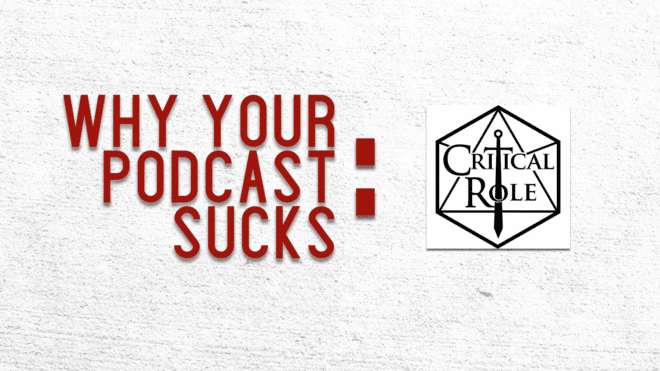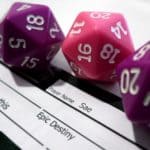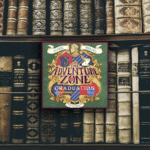Why Your Podcast Sucks: Critical Role

The Cast of Critical Role Are Nerdy Friends, But Not Your Nerdy Friends
I played my first game of Dungeons & Dragons about a decade ago, in my first year of undergraduate studies. I and six friends piled into my pal Max’s dorm room, stumbled through the thrilling world of character creation with all the zeal of people who actually like doing taxes, and created our first characters (I played a ranger Captain Frederic Mercury, because I was new to the group and eager for cheap laughs). Then we started playing. Other than Max, the DM, it was everyone else’s first time. It was also a disaster, full of railroading players, distracted players, personal beefs, and a lot of time spent for little payoff. Naturally, I came back the next week for more. So it is, too, in my experience listening to the acclaimed actual play podcast Critical Role.
When it began in 2015 as part of the Geek & Sundry network, Critical Role (or CR) was an early presence in the burgeoning actual play podcast scene, and one of the more high-profile, mainstream-ready shows, along with the McElroy-family-fronted The Adventure Zone. What set CR apart was its talented stable of famous voice actors, flexing their vocal instruments while playing the popular tabletop game. The audience wasn’t just getting a show with comedians playing pretend; they were also getting the voices behind their favorite anime and video games, being friends with each other, and performing an elaborate bit of play-acting and personality-driven content.
Players and pacing
Endemic to the concept of Critical Role is its cast. The popular voice actors who roll CR’s Dice are all talented voice actors with IMDB pages that would make your eyes light up in recognition like a switchboard, and they’re all talented performers. They are also one of seven (previously eight) players.
No matter how skilled a performer and adept a role player the cast members are, they cannot undo the fact that DM Matthew Mercer has to wrangle, on average, seven players every episode, each one playing a beloved character, and each one vying for spotlight. Seven players is a large core cast for any series, and it’s an especially large group for a game of Dungeons & Dragons. For those who’ve never rolled a d20, turns in D&D, especially during combat, the core concept to which the creators of the system devoted the most time and attention, can be a glacial affair.
When you’re playing among three or four good friends, this isn’t the end of the world. Have a snack while your good pal Vic figures out what to do with all of his fighter’s bonus actions. However, when there are at least seven Vics at a table, the flow of the game is going to be considerably impacted. Watching (or listening to) Critical Role is a lot like playing Dungeons & Dragons and waiting for your turn to play, a turn that is never coming, a release that will never arrive, a moment to actually enjoy other people’s fun without that moment ever actually arriving.
The bloated runtime also comes from another facet of the show, one which does call attention to the fact that this entire study is built on a dubious assertion: the assertion that Critical Role is even a podcast in the first place. It is primarily a live show, streamed on Twitch and Youtube, with an audio recording serving as a secondary means of getting the story.
Another unique feature of Critical Role was its enormous —and true to D&D play — run times, with episodes regularly breezing past the three-hour run time mark like they were wearing boots of swiftness (and that’s the only one of those jokes in the article). While Critical Role episodes are well-produced, they aren’t particularly edited. Every pause of a player figuring out what they want to do, every extended silence while players look at a map, every endless parroting of a joke that got a laugh stays in, and with all of that air left in the show, it makes a little more sense how three hours can go by so quickly.
Theatre Kid Energy™
Critical Role episodes aren’t just long — podcast length is very much a question of personal preference — rather, CR episodes aren’t focused. More specifically, they’re not focused on the game, so much as they’re focused on the characters— and since roleplaying is a form of improvisation and character performance happens in real time, the performer is never more than a breath away. So CR isn’t really about the characters, but about the performers. In other words, it’s overflowing with Theatre Kid Energy™.
For the uninitiated, Theatre Kids are . . . a unique breed. In this study, I’m using it to describe taking theatre classes in American schools not to practice stagecraft, make friends, pick up a fun activity or learn more about performing as a craft, but instead do it just to get famous and be seen. A lot of Theatre Kids (as opposed to the lowercase kids who do theatre) see themselves as already having all of the talent and skill needed to be successful and famous — all they need now is to Be Seen. So they pursue performing arts and brag about making their own Imdb page and, often, have parents already in the industry.
Theatre Kids perform not because they like performing, but because they like being noticed. The players on Critical Role are right that they don’t need to ply their craft anymore — they are, in actuality, already famous and successful. So what are they playing this game in front of cameras for? Because here, on screen every week, they get to be famous for performing themselves, not just a character someone else has written.
Critical Role, Wizards of the Coast, and presentation
Critical Role has also done a fair amount of Wizards of the Coast (the creators of Dungeons & Dragons, Magic: The Gathering, and other game-based nerd culture properties) and D&D as a corporate entity, which opens up a separate can of worms. This is not inherent to CR, as D&D has its fair share of prejudices to unpack and process, and every actual play show that sticks with Dungeons & Dragons as its primary game has had to make their justification for why this is the system they absolutely have to play to tell these stories.
Why must it always come back to D&D? Why is the game where certain races are just Born Evil and/or Stupid the one that is, in the mainstream, synonymous with actual play podcasts? For what it’s worth, Critical Role has been more than willing to play other games in the past for shorter, one- or two-episode specials. Their game of Monsterhearts was a particularly fun adventure.
But CR’s ties to Wizards of the Coast also indicates a separate underlying tension in Critical Role, which is its presentation. The players want to cultivate a sense of going over to your friend’s house to play game night. An opening credits video shows the cast dressing up like goofy teens and over-acting in a living room, again reinforcing the idea that the true magic of these magical worlds is the friends we make along the way. Only, we aren’t making friends with them. The players are already friends with each other.
DM Matt Mercer begins every episode by saying “Hello everyone, and welcome to tonight’s episode of Critical Role, where a bunch of us nerdy-ass voice actors sit around and play Dungeons & Dragons.” Mercer’s sly self-effacing of calling himself and his co-stars “nerdy-ass voice actors” is a peculiar turn of phrase, in that it’s trying to make them sound like the underdog, the perennially-bullied nerdy kid in school with arms full of graph paper and miniatures, looked down and misunderstood by the world.
Were you that kid? Do you want to hang out and listen to some other people who used to be that kid? Crucially, though, these players aren’t “that kid” anymore. Now they’re voice actors. Successful, professional, gainfully-employed and critically-lauded voice actors, and on top of that, they’re also running the critically-acclaimed and commercially-successful actual play campaign you’re watching or listening to. It’s a unique wrinkle in the usual question of parasocial relationships in podcasts (a favorite topic here at Discover Pods). The people at Critical Role want to put on professional performances and tell Tolkien-level grand fantasy stories–and they also want to seem like the plucky unpopular kids hanging out after school in their Game Club.
From presentation to representation
Fans have also noticed how Critical Role often fumbles its representation. For example, the nonbinary character J’mon Sa Ord, introduced by Mercer with they/them pronouns, was repeatedly misgendered by players with little to no pushback by Mercer, perhaps in the interest of keeping the game flowing—even though correcting someone for misgendering a person is definitely a sufficient reason to stop the flow of a fantasy game. In addition, some cast members have had a history trying to pull a J.K. Rowling (though thankfully not in espousing transphobia) and proclaim characters are LGBTQ+ without actually depicting them as such in play. None of these instances are monumentally negative, but they are indicative of a larger disinterest in how their stories are received — rather, for the players in Critical Role and for many people afflicted with Theatre Kid Energy™ , it’s all about being in the spotlight.
What is monumentally negative, however, is cast member Sam Riegel doing a comedy skit in blackface, or Critical Role allegedly refusing to pay a Sensitivity Consultant (CR claims that the consultant offered free advice but was never contracted to do so, and thus never paid). There was also the controversial Wendy’s sponsorship for a Feast of Legends one-shot, a TTRPG created by the Wendy’s fast food chain, which sure is . . . not something a nerdy underdog would do. CR came under fire for working with the fast food chain that famously mistreats farm workers, and to their credit they donated their ad proceeds from the one-shot to Farm Worker Justice. Nevertheless, CR’s willingness to hop into a deal with a square paddy-slinging mega-company did not sit well with fans.
Critical Role isn’t any kind of menace to society, and it isn’t any kind of masterpiece of storytelling either. Its problems are problems of personality, and the problems of building a capitalist brand off of personality and false humility. Everyone on the show appears to be having a blast doing so, and why wouldn’t they? They’re playing a game with their friends/co-workers. The amount of time it takes to listen to these friends is considerable — hundreds of hours — and what do listeners get from that? A creaky game that refuses to evolve with the times, more than a half-dozen voices vying for spotlight, and a pop culture monolith wearing the face of a scrappy, down-to-earth actual play show. Everyone working on the show is talented and skilled, there’s no question. The question is, is the show about the work they do, or is it just about them?













Comments
Comments are closed.